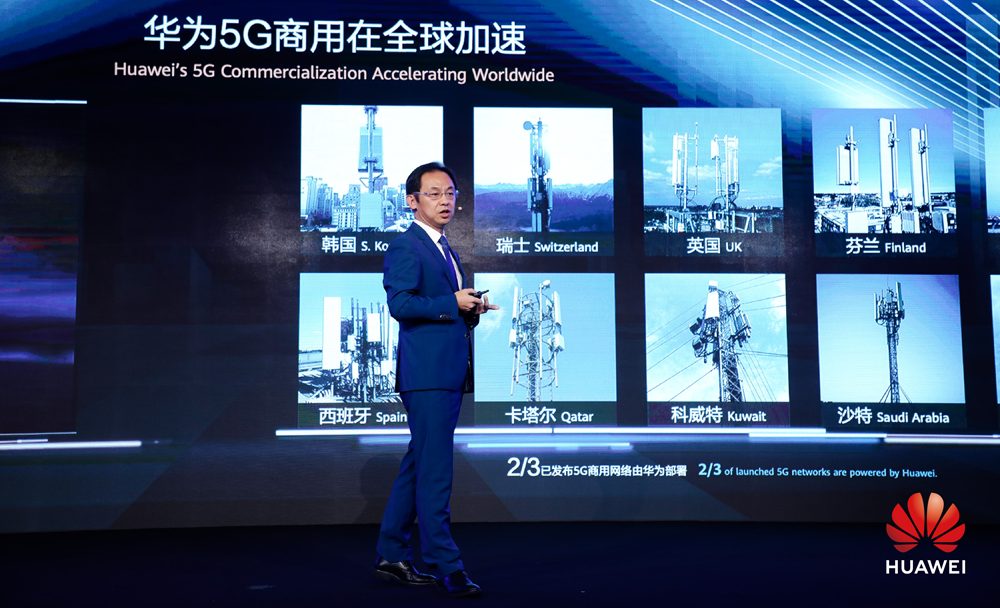Ryan Ding, Executive Director of the Board and President of Huawei Carrier Business Group, delivered a keynote speech titled Industries + 5G, Enabling New Growth at the MWC Shanghai summit.
“Huawei has so far gained 50 5G commercial contracts and shipped more than 150,000 base stations.” Ding said. “Globally, 5G is gaining strong momentum in its commercial adoption. Since the first half of this year, a good number of countries, including South Korea, UK, Switzerland, Italy, and Kuwait, have commercially launched 5G networks, 2/3 of which were constructed by Huawei. Industries are starting to embrace 5G and 5G is starting to explode into prominence by promoting a comprehensive digital transformation and improving efficiency in many industries. Huawei’s modular and full-series solutions will put operators in unique positions to build green, converged, and ultra-lean 5G commercial networks that drive continuous growth.”
[Shanghai, China, June 25, 2019] During MWC Shanghai 2019, Huawei held the 5G is ON Summit based on the theme of “5G-driven Digital Upgrades”. Ryan Ding, Executive Director of the Board and President of the Carrier BG of Huawei, delivered a keynote speech titled Industries + 5G, Enabling New Growth at the summit.
“Huawei has so far gained 50 5G commercial contracts and shipped more than 150,000 base stations.” Ding said. “Globally, 5G is gaining strong momentum in its commercial adoption. Since the first half of this year, a good number of countries, including South Korea, UK, Switzerland, Italy, and Kuwait, have commercially launched 5G networks, 2/3 of which were constructed by Huawei. Industries are starting to embrace 5G and 5G is starting to explode into prominence by promoting a comprehensive digital transformation and improving efficiency in many industries. Huawei’s modular and full-series solutions will put operators in unique positions to build green, converged, and ultra-lean 5G commercial networks that drive continuous growth.”
5G Accelerates Digital Transformation, Enables New Business Growth
5G networks are bringing VR, AR, and other ultra-HD video services to Mobile Video 3.0, and this premium experience is compelling users to change their behavior patterns. Two months after 5G was commercially launched in South Korea, the country’s 5G user base have grown to one million, with daily average traffic per person of 1.3 GB. 5G’s ARPU is 75% higher than in 4G, but the per-GB price is 90% less, meaning that both users and operators benefit.
5G technologies also enjoy ultra-high data rates, making them a big disruptor in the provision of high-definition, high-speed, and cost-efficient services across various industries.
Traditionally, live TV broadcasting requires broadcasting vehicles worth at least CNY80 million and 150 onsite workers for recording, editing, transmission, and broadcasting — not to mention the high costs arising from costly satellite transmission.
But things change with cloud broadcasting, where a less-than-CNY10,000 package that contains a 5G CPE and five workers are sufficient. Real-time video is sent back to TV stations over 5G networks, so broadcasts can happen anywhere, anytime. In addition, a premium experience and greater interaction with secondary locations can be achieved in this process.
In policing, 5G drones can be rapidly dispatched to scenes without facing the space restrictions ground officers are limited to. 4K HD videos are sent back to the command center in real time so that centralized surveillance and commanding can be implemented to ensure that details are fully captured.
Huawei Solutions Build Green, Converged, and Ultra-Lean 5G Networks
At the summit, Ding presented a video demonstrating how 5G connects various industries, such as smart transport, smart policing, smart healthcare, smart entertainment, and smart ports. Huawei offers a broad range of modular and full-series solutions, including Massive MIMO, Blade Site, and BookRRU, to help global operators build green, converged, and ultra-lean 5G networks. Their power consumption is so low that per-bit energy efficiency is 25 times higher. Huawei’s solutions also support NSA/SA dual architecture and can accommodate the radio access of all types of terminals. AAUs are 55% smaller and 23% lighter than traditional antenna-connected RRUs, making it easier for operators to achieve full coverage with their existing site resources to better serve users in hotspots and fulfill the diverse needs of various industries.

As we predicted, 5G is going to quickly overtake its preceding wireless communication technologies in speed of popularity around the world in 2019. Huawei is working together with operators and partners to expand 5G to various industries and achieve new business growth for all participating parties.
MWC Shanghai 2019 will be held in Shanghai, China from June 26–28, 2019. Huawei’s exhibition areas include halls E10 and E70 in Hall N1 and the Innovation City zone at booth ICA01 in Hall N5 of Shanghai New International Expo Center (SNIEC). For more details, please refer to http://carrier.huawei.com/cn/events/mwcs19.






